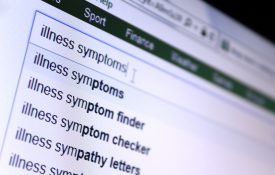-
Throwing Light on the Dark Side
Long ago, in a galaxy far, far away, there may be someone who has not heard of “the dark side.” But I think that’s unlikely. Whether you are a Star Wars aficionado or not, there
-

Checking Off Symptoms Online Affects Our Perceptions of Risk
You’ve been feeling under the weather. You Google your symptoms. A half-hour later, you’re convinced it’s nothing serious—or afraid you have cancer. More than 60 percent of Americans get their health information online, and a
-
Agreement of Alcohol Use Among Roommates
In case you missed it, the cameras were rolling at the APS 23rd Annual Convention in Washington, DC. Watch Grace Jackson from New York University present her poster session research on “Agreement of Alcohol Use
-
The Risks of ‘Racy’ Thinking
I worked in the news business for many years, and sometimes the pace could get hectic. But the work day didn’t really charge up until mid-morning. In the early morning hours, my routine was to
-
Color It Relevant
When searching for a book, the color of the cover matters a lot. Sure, you might know the title, but locating “that book with the red cover and white letters on the shelf” is easier
-
When Today’s Deal Is Tomorrow’s Regret
The New York Times: HOW much is a $150 coupon worth? For Matt Sumell, the cost turned out to be one new relationship, as well as a little bit of pride. In January 2011, Mr.

